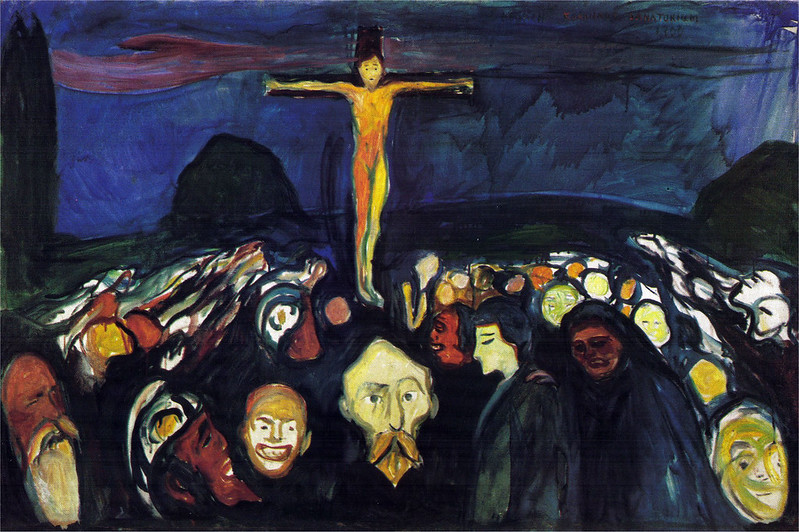Jesus Died for Us…Not for God

Jesus Died for Us…Not for God
Brian Zahnd
“You killed the Author of life, whom God raised from the dead.” –The Apostle Peter, Acts 3:15
Golgotha is where the great crimes of humanity — pride, rivalry, blame, violence, domination, war, and empire — are dragged into the searing light of divine judgment. At Golgotha we see the system of human organization that we blithely call “civilization” for what it is: an axis of power enforced by violence so corrupt that it is capable of murdering God in the name of what we call truth, justice, and liberty.
Golgotha is also the place where the love of God achieves its greatest expression. As Jesus is lynched in the name of religious truth and imperial justice he expresses the heart of God as he pleads for the pardon of his executioners. At the cross we discover that the God revealed in Christ would rather die in the name of love than kill in the name of freedom. Our savior is Jesus Christ, not William Wallace.
The cross is both hideous and glorious, simultaneously ugly and beautiful. It’s as hideous as human sin and as glorious as divine love. It is a collision of sin and grace. But it is not a contest of equals. In the end love and beauty win. We call it Easter.
What the cross is not is a quid pro quo where God agrees to forgive upon receipt of his Son’s murder. What the cross is not is an economic transaction whereby God gains the capital to forgive. These legal and fiscal models for understanding the cross simply will not do.
Jesus does not save us from God, Jesus reveals God as savior. What is revealed on Good Friday is not a monstrous deity requiring a virgin to be thrown into a volcano or a firstborn son to be nailed to a tree. What is revealed on Good Friday is the depths of human depravity and the greater depths of God’s love.
Before the cross is anything else, it is a catastrophe. It is the unjust and violent lynching of an innocent man. It is the murder of God. Jesus is sacrificed by the Father only in this sense: The Father sent his Son into our system of violent power (civilization) to reveal how utterly sinful it is — so sinful that it will murder the Innocent One. God did not will the murder of his Son, he simply knew it would occur. But even Plato knew that. In imagining what would happen to a perfectly just man in our unjust world, Plato said, “our just man will be scourged, racked, fettered…and at last, after all manner of suffering, will be crucified.” (The Republic, Book II, p. 37) Plato wrote that three centuries before Christ. God knew what Plato knew. For Jesus to proclaim and inaugurate the kingdom of God in the midst of our unjust and violent world would require a supreme sacrifice.
The death of Jesus was a sacrifice. But it was a sacrifice to end sacrificing, not a sacrifice to appease an angry god. It was not God who required the sacrifice of Jesus, it was human civilization. A system built upon violent power cannot tolerate the presence of one who owes it nothing. The sacrifice of Jesus was necessary to convince us to quit producing sacrificial victims; it was not necessary to convince God to forgive. When Jesus prays for forgiveness on the cross he was not acting contrary to the nature of God, he was revealing the nature of God as forgiving love.
Think of it this way: Where do we find God on Good Friday? Is God found in Caiaphas seeking a sacrificial scapegoat? Is God found in Pilate requiring a punitive execution? Or is God found in Jesus, absorbing sin and responding with forgiveness?
The Apostle Paul says God was in Christ reconciling the world to himself. (2 Corinthians 5:19) And this should not be misread as God reconciling himself to the world…as some mistaken atonement theories do! Jesus died for us…not for God.
The crucifixion is not what God inflicts upon Jesus in order to forgive, the crucifixion is what God in Christ endures as he forgives. The cross is where God absorbs sin and recycles it into forgiveness.
The crucifixion is not the ultimate attempt to change God’s mind about us — the cross is the ultimate attempt to change our mind about God. God is not like Caiaphas seeking a sacrifice. God is not like Pilate requiring an execution. God is like Jesus, absorbing sin and forgiving sinners.
The cross is not about payment, the cross is about forgiveness.
Good Friday is not about divine wrath, Good Friday is about divine love.
Calvary is not where we see how just God is, Calvary is where we see how unjust civilization is.
As long as we think Jesus died for God instead of dying for us, we will never see the sinfulness of human civilization and the beauty of the divine alternative: the kingdom of God.
The justice of God is not retributive justice. In the end retributive justice changes nothing. The justice of God is entirely restorative. The only thing God will call justice is setting the world right, not punishing the innocent. (Our sense of retributive justice is derived from the fact that we are more punished by our sins than for our sins.)
The bottom line is this: God did not kill Jesus, human civilization did. We did. Jesus absorbed the blow in love and forgave us. The Father vindicated his Son on Easter. Now Jesus calls us to follow him into the kingdom of grace, the kingdom of love, the kingdom of God.
Let us follow the Lamb.
BZ
(The artwork is Golgotha by Edvard Munch, 1900.)